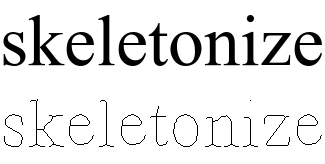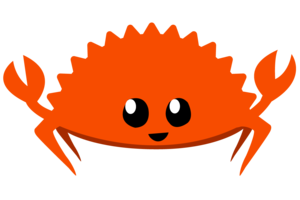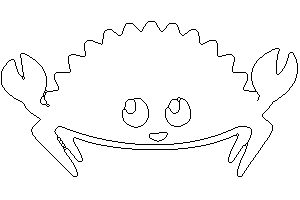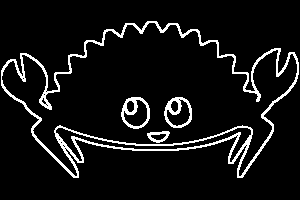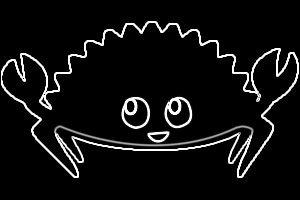A line thinning library for binary images, including edge detection and threshold functions for preprocessing images into binary images.
The goal of line thinning is to remove excess pixels from the image until the lines present are one pixel wide, resembling a "skeleton" of the original pattern. Thinning is useful for removing noise from images which have had image processing filters applied to them such as edge detection. Line thinning is similar to erosion, another morphological operator.
The thinning algorithms are based on the papers Zhang & Suen, 1984 and Chen & Hsu, 1988. See Reference.
This crate requires the input to be a type from the image crate. To use this
crate, add the following to your Cargo.toml.
[dependencies.skeletonize]
version = "0.2"- 2 line thinning algorithms
- support for black or white foreground color
- Sobel operator edge detection
- thresholding for binarization (turning an image into only black and white pixels)
The example skeletonize.rs is a command line
program available for download as a binary executable from the repository
Releases page.
Images should be viewed at 100% magnification to avoid scaling artifacts.
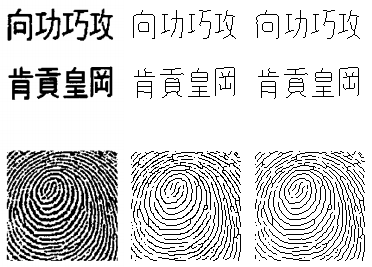
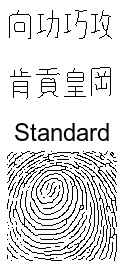
First image, left to right: Figures 7(b) and 7(c) from Chen & Hsu, 1988,
Standard algorithm result, Modified algorithm result.
Second image: Animated comparison of the Standard and Modified marking
methods.
The Chen & Hsu Modified algorithm tends to produce better line connectivity,
less noise, and more consistent single pixel width lines than the Zhang & Suen
Standard algorithm.
The original image can be found in the gfx folder entitled chenhsu.png. It
was thresholded at 0.3 to convert it into a binary image before line thinning.
The example program produced the image results with the following arguments. The
--method|-m option allows for selecting the standard or modified pixel marking
algorithm, --threshold|-t is the gray level threshold.
-i chenhsu.png -t 0.3 -m s -o chenhsu-standard.png
-i chenhsu.png -t 0.3 -m m -o chenhsu-modified.pngThe skeletonize example program exposes library functions as a command line
application. It can be run with the following command or by invoking it directly
after downloading from Releases/building it yourself.
cargo r --release --example skeletonize -- [args]The next three examples use this image as the input. All examples include the equivalent library code.
Perform edge detection with sobel4 (4-way edge detection) and line thinning,
threshold the edge detection filter to 0.3.
cargo r --release --example skeletonize -- -i rustacean.png -e sobel4 -t 0.3let mut filtered = sobel4::<foreground::Black>(&img, Some(0.3))?;
thin_image_edges::<foreground::Black>(&mut filtered, method, None)?;Perform edge detection with no line thinning, threshold the edge detection
filter to 0.3, and set the --foreground|-f color to white.
-i rustacean.png -e sobel4 -t 0.3 --no-thin -f whitelet filtered = sobel4::<foreground::White>(&img, Some(0.3))?;Return the grayscale edge detection image by omitting the --threshold|-t and
using --no-thin. Aliases are used for sobel4 and white.
-i rustacean.png -e s4 --no-thin -f wlet filtered = sobel4::<foreground::White>(&img, None))?;The title image was created with the following arguments.
-i skeletonize.png -t 0.3skeletonize::threshold(&mut img, 0.3)?;
thin_image_edges::<foreground::Black>(&mut img, method, None)?;Zhang, T. Y. & Suen, C. Y. (1984). A fast parallel algorithm for thinning digital patterns. Commun. ACM 27, 3 (March 1984), 236–239. DOI:10.1145/357994.358023
Chen, Yung-Sheng & Hsu, Wen-Hsing. (1988). A modified fast parallel algorithm for thinning digital patterns. Pattern Recognition Letters. 7. 99-106. DOI:10.1016/0167-8655(88)90124-9
This crate is licensed under either
- the MIT License, or
- the Apache License (Version 2.0)
at your option.
Unless you explicitly state otherwise, any contribution intentionally submitted for inclusion in the work by you, as defined in the Apache-2.0 license, shall be dual licensed as above, without any additional terms or conditions.

